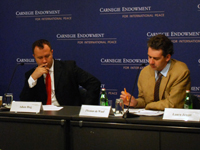Registration
Thank you!
You will receive an email confirming your registration.
IMGXYZ3074IMGZYXArmenia is under the spotlight as it emerges from a prolonged economic crisis and the government has begun a rapprochement with the mainstream opposition. To mark a new publication entitled “Spotlight on Armenia,” Carnegie hosted a panel that included Adam Hug of the Foreign Policy Center, Laura Jewett of the National Democratic Institute, and Dawn Schock of the American Bar Association to discuss the recent release of prisoners and the challenges facing Armenia’s democratic development. Ambassador John Evans was discussant and Carnegie’s Thomas de Waal moderated.
Background
In the last ten years, democratic development in Armenia displayed negative trends, consistently earning negative assessments on the Freedom House Democracy index for the violation of political and civil rights in the country. As a result of these negative trends, Armenia was recently denied continued financial support from the Millennium Challenge Corporation. Despite Armenia’s lack of progress, international organizations are hopeful that the country will realize its potential and improve the state of democracy and human rights, Jewett said.
Problems Facing Democratization
- Citizen-Elite Divide: Political elites continue to dominate the country’s debate, pushing the majority of the population to the sidelines, Jewett argued. Regular citizens are disillusioned by the lack of transparency and civil participation in the current political system, creating a mood of apathy. There is a strong disconnect between the state and the society: while citizens are concerned with issues such as economic and social conditions, unemployment, and healthcare, official political dialogue focuses instead on baiting political competitors and discussing abstract issues.
- Judicial Reform: A corrupt judiciary is one of the main impediments to Armenia’s democratic development, said Schock. The state has engaged in measures intended to improve judicial practices and promote an independent judiciary, such as constitutional revisions in 2005 that promoted stronger judicial independence. According to Schock, one of the most notable developments was the revision of the composition of the Council of Justice, a legislative body that nominates candidates for judicial appointments. While members of the council were previously selected by the president, the selection process is currently overseen directly by the judges themselves, with only four members being selected by the president and the National Assembly. Additionally, the Council improved on some of the judicial disciplinary procedures, although the majority of the procedures still lack transparency. Much remains to be done, however; the implementation of the law is weak, while judges’ rulings are still heavily influenced by the preferences of the executive and legislative branches and by bribery, said Schock.
- Elections: Flawed elections are both a cause and a symptom of the many challenges Armenia has faced since gaining independence in 1991. Opposition candidates face harassment, unequal access to the media, and limited financial and administrative resources, said Jewett. In addition, there are blatant violations of voting procedures on election day, including ballot-rigging, multiple votes by a single person, and intimidation of both voters and election observers. Most Armenians approach elections cynically, arguing that the outcome is largely pre-determined, said Jewett.
- Media Freedom: Media freedom remains one of Armenia’s main challenges. According to the most recent Freedom House ranking, it ranks 146 of 153 countries in media freedom, earning the same score as Egypt before the uprisings this year. All of the television channels are strongly pro-government, while any criticisms of the government are effectively muzzled by authorities. Although print media are more independent than television channels, their reach is more limited, said Hug.
- Empowerment of Women: Women comprise more than 50 percent of Armenia’s population, but less than 10 percent of parliament and less than 7 percent of the cabinet. According to a recent World Economic Forum report, Armenia ranked 106 out of 121 countries on women’s political representation in 2010. Women’s professional and political advancement is hampered by social and cultural factors, thus condemning Armenia to both democratic and economic underachievement, Jewett argued. She suggested the main problem for women is a lack of political will to implement and enforce the existing electoral code.
Release of prisoners
The recent release of prisoners and the initiation of the legal inquiry into the crackdown on protesters during the 2008 presidential elections were seen as a positive development by all of the panelists. The political calculations behind the amnesty are unclear, although some observers argue that the prisoners’ release was intended to help restore the government’s legitimacy after the 2008 crackdown, said Hug. Ultimately, however, the direction Armenia’s democracy takes in the future will largely determine the true impact of recent events, argued Evans.
Armenia and International Partners
- Russia: Russia is one of the most influential actors in Armenia, providing both economic and security assistance. Russia is both a source of high remittances and investments for Armenia; last year alone, remittances from Armenian citizens living in Russia amounted to 11.5 percent of GDP, said Hug. Similarly, Armenia—as a member of the Collective Security Treaty Organization, a regional military and security alliance under the stewardship of Russia—is guaranteed Russia’s support if one of its neighbors launches a military attack. This assurance is especially valuable given Armenia’s volatile geopolitical situation, Hug said.
- EU: With the United States having downscaled its financial support to Armenia, the European Union can play an increasingly pivotal role in shaping the development of Armenia’s institutions. The end of development funding from the U.S. Millennium Challenge Corporation for Armenia has led the EU to pledge to increase its aid package to Armenia, 35 percent of which will go toward improving democracy and human rights issues, Hug said. The EU can have strong leverage on Armenia’s democracy through such mechanisms as the Deep and Comprehensive Trade Agreement, a program that offers Armenia privileged access to EU markets in return for improvement in its market standards and economic liberalization. Yet, economic assistance alone is not enough: the EU must play a more coordinated and proactive role to assist Armenia in bringing about real change, concluded Hug.
